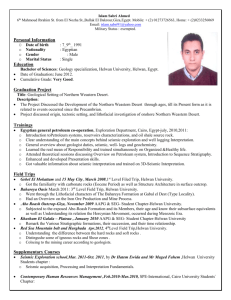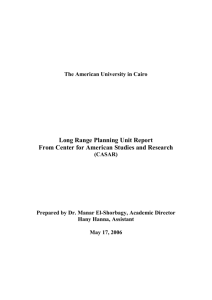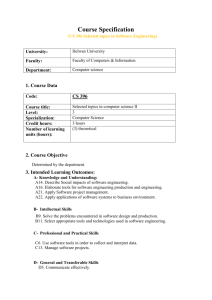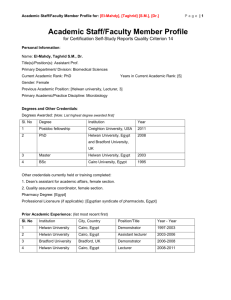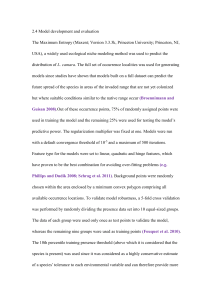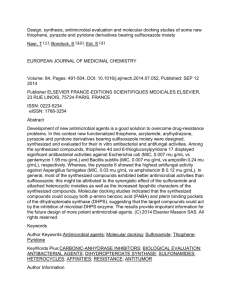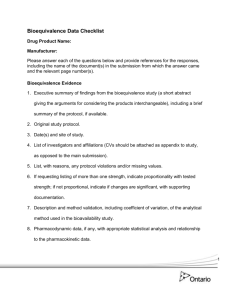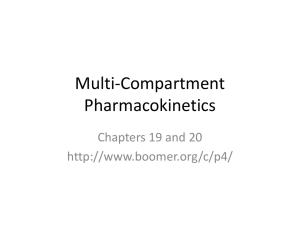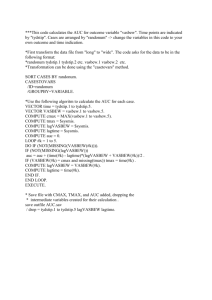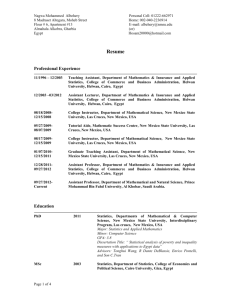here
advertisement
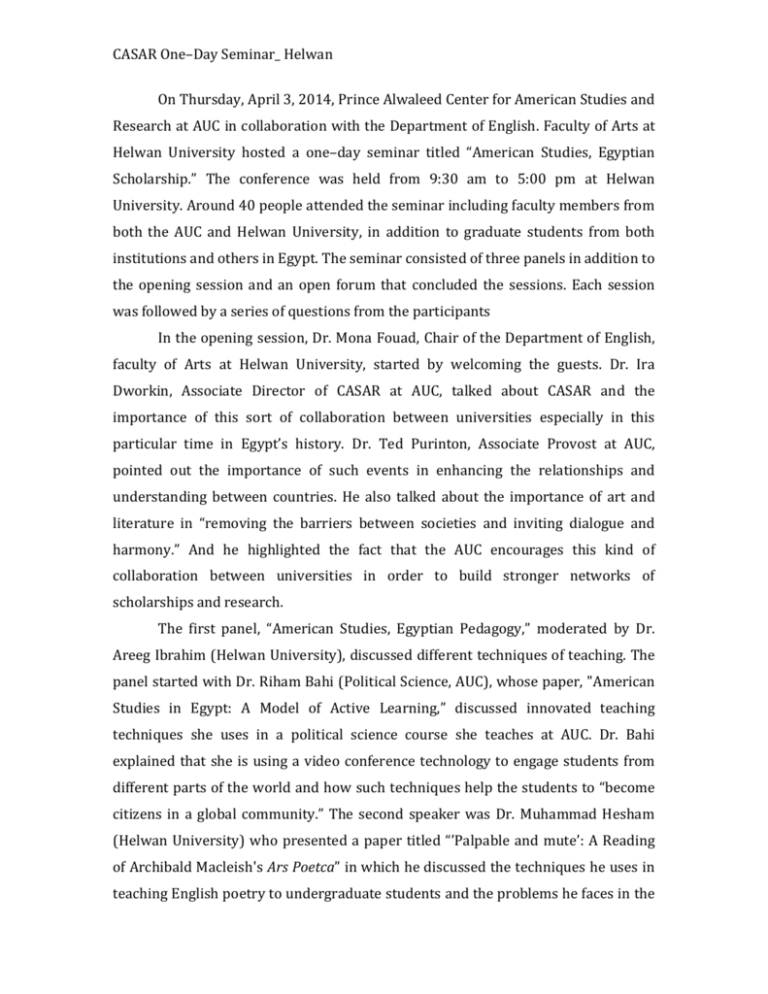
CASAR One–Day Seminar_ Helwan On Thursday, April 3, 2014, Prince Alwaleed Center for American Studies and Research at AUC in collaboration with the Department of English. Faculty of Arts at Helwan University hosted a one–day seminar titled “American Studies, Egyptian Scholarship.” The conference was held from 9:30 am to 5:00 pm at Helwan University. Around 40 people attended the seminar including faculty members from both the AUC and Helwan University, in addition to graduate students from both institutions and others in Egypt. The seminar consisted of three panels in addition to the opening session and an open forum that concluded the sessions. Each session was followed by a series of questions from the participants In the opening session, Dr. Mona Fouad, Chair of the Department of English, faculty of Arts at Helwan University, started by welcoming the guests. Dr. Ira Dworkin, Associate Director of CASAR at AUC, talked about CASAR and the importance of this sort of collaboration between universities especially in this particular time in Egypt’s history. Dr. Ted Purinton, Associate Provost at AUC, pointed out the importance of such events in enhancing the relationships and understanding between countries. He also talked about the importance of art and literature in “removing the barriers between societies and inviting dialogue and harmony.” And he highlighted the fact that the AUC encourages this kind of collaboration between universities in order to build stronger networks of scholarships and research. The first panel, “American Studies, Egyptian Pedagogy,” moderated by Dr. Areeg Ibrahim (Helwan University), discussed different techniques of teaching. The panel started with Dr. Riham Bahi (Political Science, AUC), whose paper, "American Studies in Egypt: A Model of Active Learning,” discussed innovated teaching techniques she uses in a political science course she teaches at AUC. Dr. Bahi explained that she is using a video conference technology to engage students from different parts of the world and how such techniques help the students to “become citizens in a global community.” The second speaker was Dr. Muhammad Hesham (Helwan University) who presented a paper titled “’Palpable and mute’: A Reading of Archibald Macleish's Ars Poetca” in which he discussed the techniques he uses in teaching English poetry to undergraduate students and the problems he faces in the CASAR One–Day Seminar_ Helwan process. The third speaker was Dr. Fadwa Gad (Helwan University) with a paper titled “Teaching A Pair of Tickets to Egyptian University Students” in which she discussed how her methods in teaching modern novel to undergraduate students in the Faculty of Education have changed after serving as Fulbright Scholar–in– residence in St. Edward’s University in Texas. The second panel, “Graduate Student Initiatives: Perspectives on Comparative Literary Scholarship from the AUC CASAR Workshop,” was moderated by Dr. Maha Hosny (Helwan University), discussed CASAR workshop for graduate students. It started with a word by Dr. Ira Dworkin explaining the idea of the workshop and the program that encourages the participants to share their work with others and get a feed back on their work. Dr. Dworkin added that “the idea and goal of this is to create a community of people who are able to share their work and learn from each other.” Three members of the workshop presented their works: Sarah Mustafa (Helwan University): “Post-postmodern Revival of Morality in the Post-Apocalyptic Worlds of José Saramago’s Blindness and Cormac McCarthy’s The Road.” Asmaa Abdallah (AUC) “Anti-Marriage Plot: Confinement and Consumption in the Fiction of Margaret Atwood and Hanan Al–Shaykh.” Nermine Sergius (AUC) “Time Regained: Reading Alternative History in Octavia Butler’s Kindred and Najwa Sha‘ban’s Al-Ghurr.” The session was followed by a series of questions from the guests to further understand the idea of the workshop. Each of the panelists gave her view on how the workshop, the discussions and feedbacks have helped in shaping her work and encouraged her to continue on her project. The third panel, “Media, Performance, and American Studies,” moderated by Dr. Mounira Soliman (AUC), included three talks: Dr. Ebony Coletu (AUC), presented a paper titled "Remembering Roots: Rethinking Global TV Studies in Egypt" in which she discussed the Egyptian audiences’ different reactions to the mini series Roots that was broadcast on Egyptian television in 1979, and how some of these reactions were connected to the sociopolitical conditions of Sadat’s rule. Dr. Amani Youssef (Helwan University), presented her paper “Metaphor in the Bear and Bull Markets: A Corpus‐Based Study” in which she analyzed the language used in American financial reporting. Dr. Ahmed Al‐Imam (Helwan University) presented a paper CASAR One–Day Seminar_ Helwan titled “Linguistic Analysis of Amiri Baraka’s Dutchman” in which he discussed race and language in Baraka’s play Dutchman. The fourth session was an open forum titled “American Studies, Egyptian Universities: Student Perspectives.” The session included students from four different universities: Zainab Magdy (Cairo University/CASAR workshop), Heba Ahmed (Minia University/CASAR workshop), Mohamed El Daly (AUC), and Hend Hashem (Helwan University). Dr. Ira Dworkin, the session moderator, started the forum by posing the question “what are American studies in its broadest sense?” The students offered their personal definitions of American studies and their ideas of how to establish dialogues with American or international students through different channels and mediums that allow for exchanging different points of views. The session was followed by a discussion; one of the questions discussed the issue of academic associations taking a political stand, another question tackled the multiculturalism of American culture. Other questions further discussed the definition of American studies, politics, and literature among other things. Written By: Nermine Sergius Research Assistant, Prince Alwaleed Center for American Studies and Research
